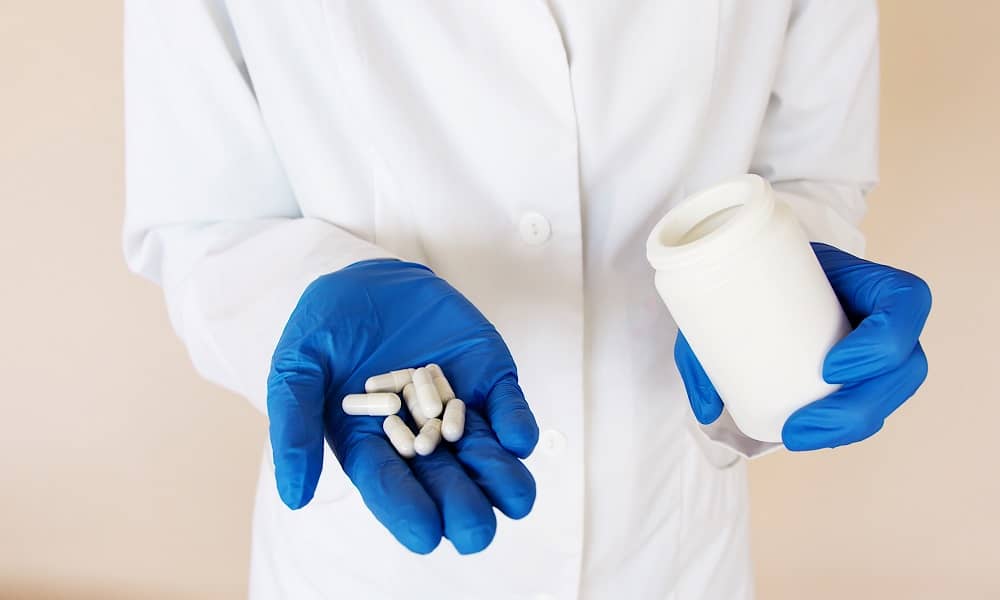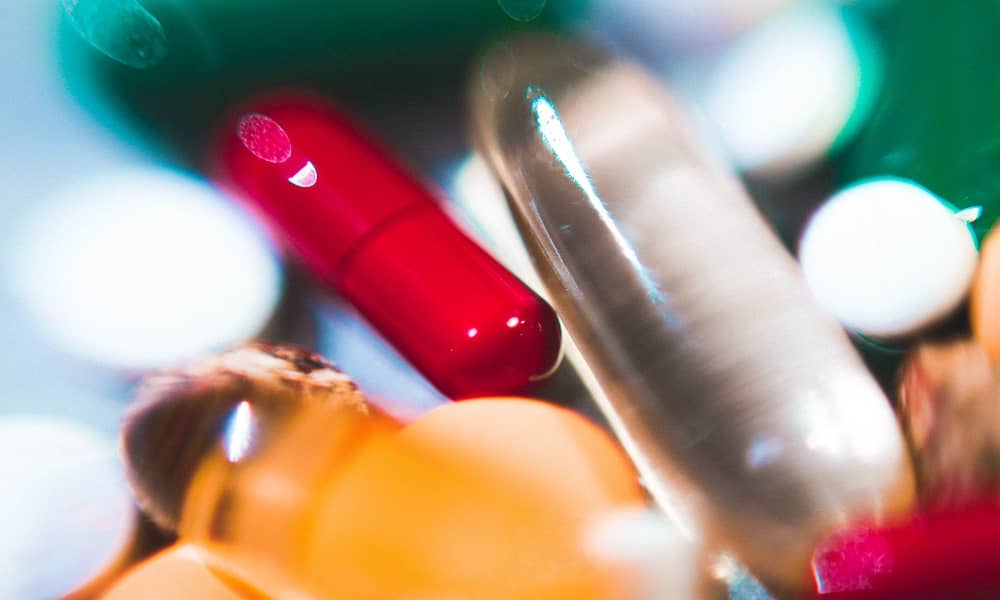
31 May What are the Signs You Need Probiotics [FAQs Included]
Digestive issues, constant anxiety, and skin conditions might be some of the first signs that indicate you need to include a probiotic in your diet.
Our body is in constant fight between good bacteria and bad bacteria. Probiotics are among the good ones.
Probiotics have numerous health benefits as documented in several studies and research.
Taking probiotics as a part of a healthy diet for various beneficial reasons is a favored choice in nutritional therapy.
So, if you’ve been asking, Should I take probiotics, the answer is definitely YES!
But when it comes to involving probiotics in your diet, you need to be aware of what probiotics supplements do, the key benefits of taking probiotics, the risks, and who shouldn’t take them.
This beginners’ guide to probiotics will fill you in on every detail of probiotics.
INSIDE TODAY’S POST
#1. 8 Signs You Need Probiotics
#4. Probiotics Facts
#6. The Downside of Taking Probiotics
#7. Who Should Not Take Probiotics?
#9. Frequently Asked Questions About Probiotics
So, let’s start with the million-dollar question…what are the signs that indicate you need probiotics?
8 (Obvious) Signs You Need Probiotics
Thinking of loading up on kefir, yogurt, and kombucha?
While this is all well and dandy, chances are that one cup of yogurt a day won’t be able to satisfy the concentrations you need.
You’ll really have to supplement when your gut flora has been heavily compromised.
And how would you know that?
Well, here’s a quick list for you to check out the signs that might indicate the need for a probiotic.

#1. If you’ve been suffering from a digestive tract issue
These can include diarrhea, IBS, gas, constipation, and indigestion.
#2. If you’ve skin conditions like eczema, acne, psoriasis, or rashes
These can indicate pre-existing gut issues.
Take note to check for hormonal issues for acne as well before you take probiotics.
#3. You’ve daily stress, anxiety, and a depressive mood without any other known cause
Your brain behavior is most likely out of sorts due to unbalanced gut flora.
#4. If you’re having a sweet tooth lately
The kind of food you crave might be a good indicator of the kind of bacteria you’re hosting.
#5. If you were on antibiotic medication
Antibiotics do not discriminate good from bad bacteria. So, if you’ve just finished a round of antibiotics, think about rebalancing the gut flora with a probiotic.
#6. Your metabolism is out of whack
Interestingly, obese people are found to have a limited diversity of gut bacteria.[Gut microbiome and obesity]
#7. Food poisoning
There can be two scenarios.
If you recently ate something that had gone bad. Or you’ve had an episode of food poisoning.
Both these are clear indicators of bad bacteria invading your system. Think about taking probiotics to ward off the bad guys and bring back your gut to normal.
#8. Yeast infections
This means there’s an abundance of bad bacteria infesting the gut flora. Probiotics might help balance that out.
Now, you know you might need a probiotic if you’ve got these complaints.
NOTE: Before jumping onto the probiotics bandwagon, first try to improve your diet and eliminate allergens. Try eating healthy and avoid pre-packaged foods.
Avoid dairy, gluten, and soy, based on your allergies. After doing all this, if nothing improves, then it’s time to shell out some money on probiotics.
Having said that, here’s a thorough guide to selecting a probiotic that will work for you.
A Definitive Guide to Taking Probiotics
Right below is everything you would need to know about selecting probiotics, the risks involved, and the ways through which you can take probiotics.
Choosing Safe Probiotics
With a large number of probiotics available, choosing the right one becomes really difficult.
In the US, they are sold as food constituents, medicine, and dietary pills. Mostly, these come under the regulations of the FDA.
Still, most of them don’t require approval before reaching the market and consumers. Some companies take advantage of these loopholes to sell unregulated prebiotic supplements.
Thus, the key is to dig in a little and know about third-party testing, users’ feedback, and its formulation before hitting the buy button.
This decreases the possibility of Probiotics’ side effects. Usually, these supplements don’t show any negative effects, unless they are undermined products.
Furthermore, the probiotic you choose should be high-quality and have a good concentration of viable bacteria.
Check out the subsequent segments to find out more about probiotic benefits and the right way to take them.
How Do Probiotics Work?
Probiotics are responsible for maintaining a healthy balance and the overall health of your body.
In other words, it keeps your body in a neutral situation.
Here’s what happens when you start taking probiotics…
When you are ill, bad bacteria arrive in your body and multiply themselves. This disturbs the natural balance of your body.
Here comes the role of good bacteria. They fight off the bad ones and return your gut to balance making you feel better.
Not only does a probiotic help maintain good health but also strengthens your immunity and subsides inflammation.
Some friendly bacteria help in these ways:
- Runs digestion process smoothly.
- Keeps control of bad bacteria to prevent ailments.
- Make vitamins.
- Support the cell lining in your stomach to prevent bad bacteria, entered through certain food consumption, from entering your blood.
- Breakdown and absorb medications.
The body process of balancing everything occurs round the clock.
Friendly bacteria are a natural part of your body. They can be maintained by relying on a healthy diet.
Henceforth, eating a balanced diet rich in fiber maintains the proper number of good bacteria.
There’s another thing in vogue right now, prebiotics.
So…
Is Prebiotics the Same as Probiotics?
They aren’t the same.
Prebiotics are non-digestible food constituents that selectively promote the development or activity of desirable microorganisms.
On the contrary, a probiotic is a combination of live friendly microbes.
What are Synbiotics?
Synbiotics are products that have both probiotics and prebiotics.
They are used in diverse situations and relatively show the effectiveness of both products.
Probiotics Facts

Good microorganisms have actual health benefits. In fact, they outnumber the bad bacteria to ensure your well-being and overall health.
An estimated figure indicated the actual numbers of microbes on your body to be about trillions.
In other words, the micro world present around your body is like a different organism working in a forest. While they also help maintain the food chain, the microbes here help to determine your health and well-being.
These microbes include:
- Bacteria
- Fungi (including yeasts)
- Viruses
- Protozoa
Fun fact!
Everyone has a unique microbiome. So, no two persons can have similar microbial conditions. This applies in the case of twins as well.
Every microbe isn’t a probiotic, though. There are conditions!
These primary conditions are:
- Endure in your intestine after ingestion (being eaten).
- Have a verified advantage to you.
- Can be taken safely.
What Types of Bacteria are in Probiotics?
Probiotics aren’t a group of single microbes. Instead, they are a collection of diverse microorganisms.
Typically, these dietary supplements have bacteria belonging to Lactobacillus and Bifidobacterium group.
Also, they may include other bacteria as probiotics and even involve yeast, such as Saccharomyces boulardii.
All probiotics have different effects, though.
For instance, if a certain kind of Lactobacillus fights off an ailment, it doesn’t mean another kind of the same bacteria will have similar effects.
The most common probiotics belong to the Bifidobacterium or Lactobacillus family. They are:
- B. bifidum
- L. acidophilus
- L. casei
- B. longum
- B. breve
- L. rhamnosus
- L. bulgaricus
- B. infantis
- L. plantarum
- L. helveticus
Where Do These Beneficial Probiotics (Microbes) Live in My Body?
In general, good bacteria reside in your gut, mostly in the large intestine for purposeful help in the digestive process.
However, they can remain in various locations in and on your body. This includes:
- Gut
- Skin
- Lungs
- Mouth
- Vagina
- Urinary tract
Good bacteria are widely used for digestion-related issues raised due to an unhealthy lifestyle.
Knowing the signs probiotics are working and making sure of the benefits help determine your wellbeing.
Probiotics Benefits | What are Probiotics Good for?

Probiotics are beneficial for your overall health. It can help either to treat health issues or even prevent others.
The benefits include restoration of bacterial balance to your microbiome after antibiotics intake or treating diarrhea.
More effects are under observation.
Plus, in spite of the evident benefits, we know not all of us like to take supplements.
So, why should I take probiotics?
While it’s not always required that you take probiotics, know that good bacteria show promising results in preventing quite a few issues.
It provides a favorable difference in these conditions:
- Constipation
- Colon cancer
- Yeast infections
- Type 2 diabetes
- High cholesterol
- Lactose intolerance
- High blood pressure
- Irritable bowel syndrome and colitis
- Infections due to a weakened immune system
- Helicobacter pylori (the bacteria that causes ulcers)
Available findings support the usage of a probiotic in certain gastrointestinal disorders. Meanwhile, more evidence is coming out in support of the effects.
However, the American Gastroenterological Association, in its 2020 Clinical Practice Guidelines, didn’t officially affirm them as a treatment.
Exceptions were present in the case of clinical trials. They are most likely to support your immune system.
Apart from the benefits, we can’t deny the possibilities of side effects and downsides.
What is the Downside of Taking Probiotics?
Generally, probiotics are safe and well-tolerated.
Different good bacteria supplements are manufactured under different regulations making the quality and efficiency differ. This gives rise to the chances of side effects.
Possible Side Effects of Taking Prebiotics
During initial use, a probiotic supplement may lead to side effects related to digestion. This includes gas, burping, and even mild abdominal discomfort.
Once your body adjusts to the new environment, your digestive system begins to improve.
Who Should Not Take Probiotics?
In people with certain conditions, a probiotic should be avoided.
- People on immunosuppressant medication or are immunosuppressed.
- People with conditions like HIV and Aids – In people having a weak immune system with health conditions like HIV and AIDS, probiotics can result in hazardous infections.
- If you already have good gut health.
Additionally, for people with health conditions, consulting a medical expert is crucial.
How to Take Probiotics?
A healthy consistency of good bacteria ensures your well-being. You can increase the good bacteria in a lot of different ways.
Here’s a bit of help…
- Yogurt or food: Yoghurt is the primary way to increase good bacteria. You can also have kefir (a yogurt-type drink), buttermilk, and fermented food, such as kimchi or sauerkraut. Comparatively, these foods have a greater consistency of good bacteria than other foods. However, other probiotic sources have a better consistency.
- Powder: Probiotics are available in powder form. You can mix them in water and have them directly. Nonetheless, they might require refrigeration.
- Capsules: These are the most common forms of probiotics. Usually, they are Lactobacillus acidophilus or Bifidobacterium bilious. This also requires freezing. You can also use a probiotic supplement made with a clinically-backed formula.
- “Pearl” Form: These look like very small, round pills, probiotic pearls that pass through your stomach to reach your intestinal tract. Stomach acids are bad for microbes as they kill them before they enter the large intestine. Hence, impairing the benefits of taking probiotics.
Hopefully, this guide to probiotics answers if you should take probiotics or not.
Check out some of these other queries to ensure you know the right way to use a probiotic.
FAQs
In this segment, we have answered various other questions related to probiotics.
Q1: When Is the Best Time to Take Probiotics?
Probiotics work best when taken on an empty stomach.
Doing so makes the good bacteria reach your intestine effectively.
So, the best time of day to take probiotics is in the morning before breakfast or before hitting the sack.
Q2: How Long Do Probiotics Take to Work?
Usually, people take probiotic supplements under special health conditions to provide the gut microbiome with some additional support.
Once you stop the intake of good bacteria, it takes one to three weeks for your body to return to its pre-supplementation condition.
Still, the benefits of taking probiotics will hopefully last in the long run.
Q3: When Should You Take Probiotics?
There are a few signs that indicate the need for taking a probiotic. In case you observe them, consult with your medical health provider before proceeding further.
In case you didn’t get the time to read out the signs in detail, here’s a snapshot for quick reference:
- Digestive issues
- Skin issues
- Stress, anxiety, and mood disorders
- Excessive sugar cravings
- Recent antibiotic medication
- Slow metabolism
- Food poisoning
- Yeast infections
Q4: Should I Take Probiotics Every Day?
Well, there are exceptions, but, generally, it is safe.
Still, it’s better to have medical supervision before making sudden long-term changes in your diet, especially if you’ve any pre-existing medical condition.
Q5: How Often Should I Take Probiotics?
Directions on when to take probiotics suggest taking one dose daily.
During the initial days, people are likely to experience loose stool. However, this goes away with time. Taking the probiotic supplement after finishing your meal helps lessen your symptoms.
Q6: Should I Take Probiotics with Antibiotics?
Taking probiotics with antibiotics is a separate topic on its own.
A quick thumb rule is to take good bacteria 2 hours before or 2 hours after taking antibiotics. This provides antibiotics enough time to function without disrupting the friendly bacteria.
You can prefer to take it after you’ve finished your antibiotics medication.
Q7: What Happens When You Stop Taking Probiotics?
Once you stop taking the good bacteria, your gut begins adjusting to the new situation.
It takes almost 1-3 weeks to get to the new routine. However, this doesn’t negate the numerous benefits of taking probiotics in the long run.
Q8: How Much Probiotics Should I Take A Day?
The dosage varies with the product. Also, they differ for the different age groups.
Here’s the quantity you should take:
- 5 to 10 billion Colony-Forming Units (CFUs) per day for children,
- from 10 to 20 billion Colony-Forming Units (CFUs) per day for adults.
In general, daily intake of good probiotics should be enough to meet your needs. Hopefully, you’ve found this blog useful. Drop your comments down below to let us know of any more questions you may have.



No Comments